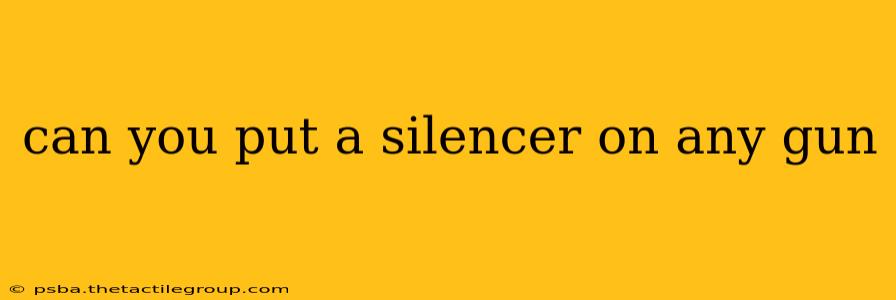Can You Put a Silencer on Any Gun? The Complexities of Suppressor Compatibility
The simple answer is no, you can't just slap a silencer (more accurately called a suppressor) onto any firearm. While the idea of silencing any gun might seem straightforward, the reality is far more nuanced, involving factors like firearm design, caliber, and legal regulations.
Understanding Suppressors and Their Mechanics
Before diving into compatibility issues, let's clarify what suppressors do. They don't make a gun completely silent, but significantly reduce the sound of a gunshot by slowing and expanding the gases expelled during firing. This is achieved through a series of baffles within the suppressor's cylindrical body. The effectiveness of a suppressor depends on various factors, including its design, materials, and the cartridge being fired.
Key Factors Affecting Suppressor Compatibility
Several crucial factors determine whether a suppressor can be fitted to a specific firearm:
-
Caliber: Suppressors are designed for specific calibers. A suppressor made for a .22LR won't fit a .308 Winchester, and attempting to force a mismatch can result in damage to the firearm or suppressor, or even injury. The suppressor's bore diameter must precisely match the firearm's muzzle diameter.
-
Thread Pitch: The threads on the muzzle of the firearm and the suppressor must perfectly align. Different manufacturers use varying thread pitches (the number of threads per inch), making it crucial to ensure compatibility. Improper threading can lead to insecure mounting and potential malfunctions.
-
Firearm Design: Some firearms are simply not designed to accommodate suppressors. Certain actions or muzzle designs might not have the necessary threading or space for a suppressor to be attached securely. This is especially true for older or less commonly modified firearms.
-
Gas System: The firearm's gas system (for semi-automatic firearms) can be affected by the added back pressure of a suppressor. Some suppressors might not function optimally, or might even cause malfunctions, on certain firearms due to this gas system interaction.
Legal Considerations: A Crucial Factor
Beyond technical compatibility, legal restrictions significantly impact suppressor usage. In many jurisdictions, owning and using a suppressor requires specific licensing, registration, and background checks. These regulations vary widely across different countries and even states within a country. It is crucial to understand and comply with all applicable laws before even considering purchasing or using a suppressor. Failure to do so can result in severe legal penalties.
In Conclusion: Professional Guidance is Key
Determining suppressor compatibility requires careful consideration of several technical and legal aspects. Attempting to fit a suppressor without the proper knowledge and expertise can be dangerous and illegal. Always consult with a qualified gunsmith or firearms professional to ensure compatibility and proper installation. They can help assess your firearm's suitability for a suppressor and guide you through the legal process of acquiring one, if applicable. Remember, safety and legality should always be your top priorities.

